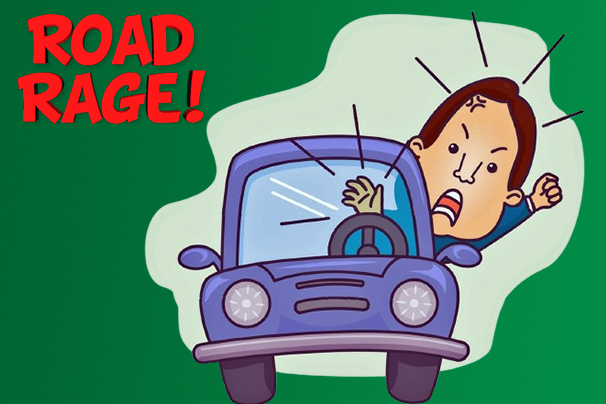Yes, road rage could create an impact on your car insurance and also your premiums. Road rage involves aggressive or violent actions while driving, often caused by frustration or stress in challenging driving events.

Moreover, while it’s normal to feel irritated at times behind the wheel, engaging in aggressive behavior towards other drivers typically doesn’t influence your insurance expenses. However, if road rage leads to a traffic violation or accident, it could impact your auto insurance rates going forward. Lastly, it’s important to note that aggressive driving is not the same as road rage driving.
Differences Between Aggressive Driving and Road Rage Driving
Aggressive driving and road rage are different events, each with its legal implications. While specific definitions may vary by jurisdiction, aggressive driving typically constitutes a traffic offense, whereas road rage can escalate to criminal assault.
In addition, aggressive driving may result in road rage, but not every aggressive driving involves road rage. Aggressive driving reflects recklessness and a lack of regard for others’ safety, while road rage involves deliberate actions intended to harm others.
Moreover, one is characterized by carelessness, while the other manifests as violence. Aggressive driving is generally categorized as a minor wrong-doing driving violation, but road rage is considered criminal behavior.
What Are The Signs Of Road Rage?
Road rage is a common issue, with various numbers of drivers reporting their encounters and 30% experiencing face-to-face confrontations with other drivers. However, recognizing common signs of road rage is watch out for are:
- Speeding
- Abrupt braking
- Tailgating or insufficient space between vehicles
- Impatient driving behavior
- Shouting and gesturing
- Horn honking or flashing headlights
Additionally, if you encounter a driver exhibiting such behaviors that can be unsettling, remain composed and continue driving normally. However, if you feel uneasy, consider pulling over safely or altering your route to avoid the situation.
Lastly, if you notice yourself becoming agitated and driving recklessly, find a secure location to stop and regain composure. Observing these road rage signs empowers you to identify them in other drivers or yourself and safer road experiences.
Why Is Road Rage Dangerous?
The punishment for road rage can be more serious than you expected. In most situations, you and the other driver could be shouting in stress and they eventually continue their journeys with the incident fading from memory.
However, road rage could lead to the following consequences:
Accidents
When you are focused on the source of your anger or another driver’s road rage, your attention to the road is no longer there. This distraction can increase the chance of making errors and being involved in accidents.
Physical Confrontation
It’s not uncommon for drivers to exit their vehicles and express their aggression by becoming involved in a physical confrontation.
Health Problems
The stress due to road rage can increase blood pressure levels. If these occur regularly, individuals may be diagnosed with long-term high blood pressure (hypertension).
Moreover, hypertension can contribute to various health complications, including a weakened immune system, heart disease, stroke, aneurysm, and dementia.
Carjacking
Carjacking is an extremely dangerous crime in which a vehicle is forcibly stolen from the driver while they are operating the vehicle. In severe events, extreme cases of road rage could potentially result in carjacking.
How To Avoid Been A Victim Of Road Rage
Given the prevalence of angry and upset drivers on the roads, your safety must involve maintaining composure and adapting your driving habits accordingly. However, there are three key recommendations to avoid road rage while driving:
Avoid Provoking Other Drivers
Most studies, questionnaires, and surveys consistently reveal common irritants for drivers. This includes cutting people off, driving slowly in the passing (left) lane, tailgating, and making obscene gestures. These behaviors are known triggers for frustration among fellow drivers.
Refrain From Engaging In Confrontational Interactions.
One of the most crucial tips for ensuring your physical safety on the road is to resist the temptation to retaliate against aggressive drivers. While it may be tempting to correct their behavior, it’s essential not to give in to this urge.
However, if you have made a mistake, such as cutting someone off, immediately signal an apology using an appropriate gesture. If your attempt fails and you find yourself facing an individual intent on confrontation, take various measures to de-escalate.
In addition, create distance by dropping back and providing space between your vehicle and theirs. Lastly, keep your safety by attempting to remove yourself from the situation as swiftly and safely as possible.
Remain Claim
Among the three key recommendations, this particular one is challenging because it needs your self-awareness and the conscious decision to take the high road.
This implies when facing some poor driving behavior directed towards you, it’s essential to regulate your own response. Furthermore, you have control over how you react in these situations.
Conclusion
Road rage could create an impact on your car insurance by assessing any dangerous incident which you are accountable for. Also, any individual that anticipates in such an incident would be responsible for covering all damages and expenses personally, directly from your funds.
